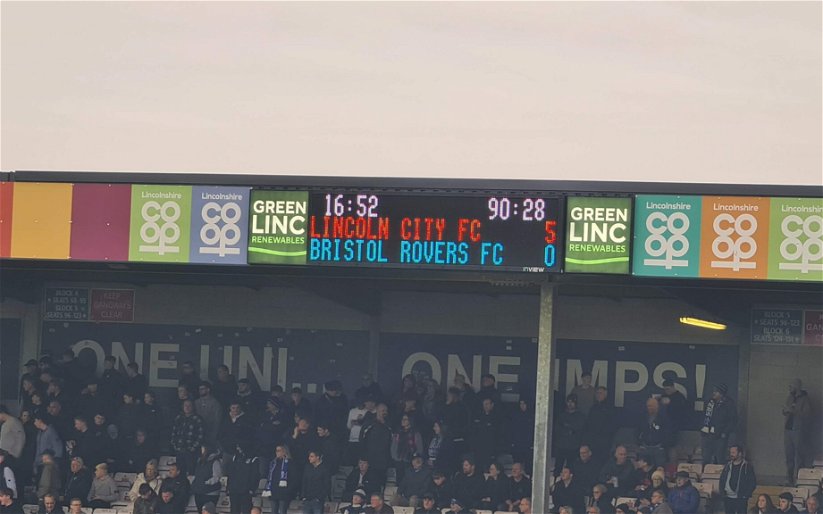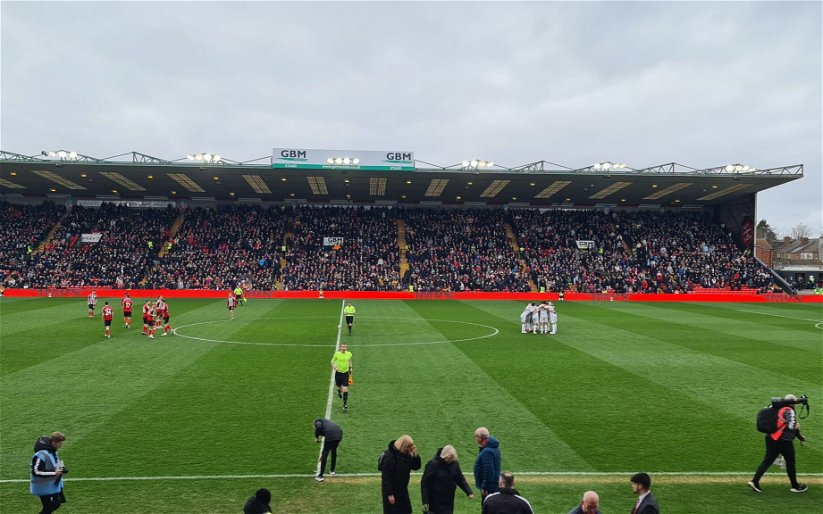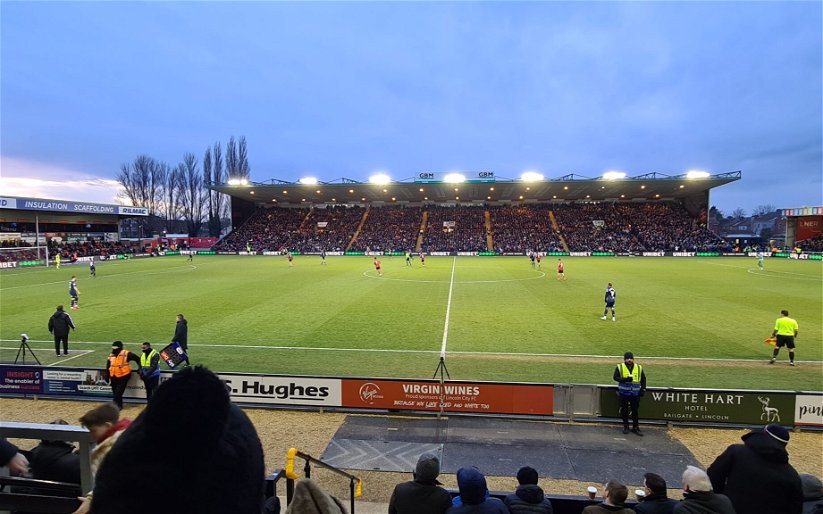Saturday’s game against Aldershot was a hugely entertaining one by all accounts, yet it has been a little overshadowed…
Without getting political, has anyone noticed the similarities between FIFA and the EU? Both byzantine organisations operating as a law unto themselves, essentially run by the Germans and Swiss, dogged by allegations of incompetence and corruption and staffed by precisely the kind of people you would not want living next door to you. The notorious claim that the EU has no idea how many people it employs is apparently true, which is astounding in this age of computerisation, auditing and financial compliance. But in terms of obsessive lawmaking and a perverse, almost moronic devotion to the creation of unnecessary rules and regulations, these two set new standards. The only difference is that we cannot have a referendum to opt out of FIFA; that would be an interesting vote, wouldn’t it?
Take the offside rule, for instance. It used to be very simple despite Garth Crooks’ legendary inability to explain it to Mr Blobby: if there are not at least two players from the defending side between the attacking player receiving the ball and the goal-line at the time the ball is played, it will be deemed offside. Easy. Everyone knew the score and the only grey area was whether or not the linesman had got it right. But watch any televised match today and you will see numerous instances of complete confusion and post-match controversy caused by an over-complication of that original rule. Not only do the poor referee and linesmen (sorry, assistant referees – another cretinous and entirely unnecessary change of title emanating from the bowels of FIFA Towers) have to assess the relative position of the players at the time the ball was played, they also have to consider whether or not a player in the line of the goalkeeper’s vision was ‘interfering with play’. Why? What was wrong with the old rule, for Christ’s sake? It has confused the hell out of poor Glenn Hoddle, that’s for sure.
Next. On the subject of referees, hands up all those who remember the days before red and yellow cards? Referees had a notebook and a pencil they had bought from WH Smith, and were allowed discretion over when to use it. There was no such thing as ‘yellow card offences’ or ‘an automatic red’; it was not prescriptive because every game was different. A referee used his judgement to assess the point at which any given player had overstepped the mark, and it worked very well. The game flowed far better because there were fewer stoppages for the waving of brightly-coloured cardboard. Try standardising something that is inherently variable, and you have a very serious mess on your hands, but that is what the rule makers have imposed upon the game. There is no room for referees to manoeuvre anymore, and the game has been strangled by it.
Saturday’s game against Aldershot was a hugely entertaining one by all accounts, yet it has been a little overshadowed by the reaction of visiting manager Gary Waddock to Lincoln’s late equaliser. The reason for his slightly deranged post-match interview lay in the belief that the game should have been stopped when Aldershot starlet Idris Kanu collapsed to the turf with cramp. According to the current rules, he is completely and utterly wrong. Those rules state that the game should only be stopped for a head injury, and certainly not for cramp. Yet the rule has created a major grey area, one far larger than the problem it was created to eradicate, and it falls under the banner of sportsmanship. I am sure Mr Waddock feels Lincoln should have ‘done the decent thing’ and put the ball out of play, but they are under no obligation to do so. And should they have had the ball back when play re-started? Aldershot would have been under no obligation to do that either. Now consider this scenario: what if Kanu had suffered a compound fracture of his leg instead of a head injury? What if he had suffered a major cardiac incident like Marc-Vivien Foe or Fabrice Muamba? According to the FIFA rule, that is less serious than the head injury. In that sense, Mr Waddock is probably right. But it is the presence of that stupid rule in the first place that causes confusion amongst players and ill-feeling amongst managers. Remember the Guiseley v Braintree match last season? I bet Danny Cowley does. Let the referee have some discretion back and we will avoid this kind of situation. It is all very confusing and entirely unnecessary.
And what about the increasingly bizarre rules surrounding when a player must leave the field following treatment and when he can stay on? Who the hell…oh, I can’t be bothered anymore.
Younger readers with no knowledge of the game prior to the modern day will probably wonder what I am rattling on about, but it is very simple. Rules create robots. Football is not a robotic sport, it is a naturally dynamic game played at high speed and is intended to be exciting for the spectator. It is a very simple game that has been complicated by small-minded bureaucrats with no understanding of its DNA. It is a contact sport, a game of rough-and-tumble played by outstanding athletes who are all perfectly capable of looking after themselves. Let them do it.
How did Vital members rate City’s performance against The Shots?
First place goes to the exciting NATHAN ARNOLD, whose two-goal salvo sent the Imps in at half-time with a well-deserved lead. Nathan is now in second place in the goalscoring stakes with 7, all of which have come in the league at Sincil Bank. Forest Green would be a great place to break that run.
“Excellent game, could have had a hat trick if he had played 90 minutes, superb movement.” (IMP757)
“Quality performance and 2 great finishes. Changed the game when he became ill.” (johnolbe)
“Intelligent footballer, two great finishes.” (Big Jack McGinley)
Second place goes to Arnold’s fellow winger HARRY ANDERSON, who is trying to turn the player ratings into a one-man contest. With both wide men off the field within 20 minutes of the re-start, we can only wonder how this match would have turned out had the two of them been able to play to the final whistle.
“A threat as always, we lost much of our momentum without him.” (plumbob)
“Kicked out the game by their players, same as Arnold in that we missed him after he went off.” (Davidimp)
“Cynically taken out of the game.” (Red Wimp)
In third place comes last-gasp hero MATT RHEAD, whose 9th goal of the season earned a point that looked unlikely with Aldershot players littering the Sincil Bank turf. Fortunately for us, the referee played to the rules and Rhead has now scored in three successive league games after a run of eight without. His 32 goals for the club leaves him just two behind Ben Tomlinson’s post-relegation record of 34, and one behind Alan Power on 33.
“Put in his usual shift and I’m glad it was him on the spot in the 96th minute.” (Big Jack McGinley)
“Scored the equaliser, what more to say?” (Jaggy Imp)
“The Fat Monk deserves a Trappist Ale.” (Notty Imp)
The average team score of 6.05 only just crawled over the par score of 6.0, and is the lowest since the defeat at Dover.
1. Nathan Arnold 7.89
2. Harry Anderson 7.00
3. Matt Rhead 6.94
4. Bradley Wood 6.39
5. Paul Farman, Sean Raggett, Alex Woodyard 6.0
8. Sam Habergham 5.78
9. Luke Waterfall 5.72
10. Alan Power 5.58
11. Theo Robinson 5.22
12. Jack Muldoon, Terry Hawkridge 5.06
Media Roundup: Lincoln 3 Aldershot 3
August Player Ratings: The New Era Begins
September Player Ratings: Why We Should Take A Leaf Out Of George Harrison’s Book
October Player Ratings: Three Cheers For Gary Crowley!
Average Player Ratings v Altrincham FC (H – FA Cup)
Article Photograph taken by Graham Burrell.



